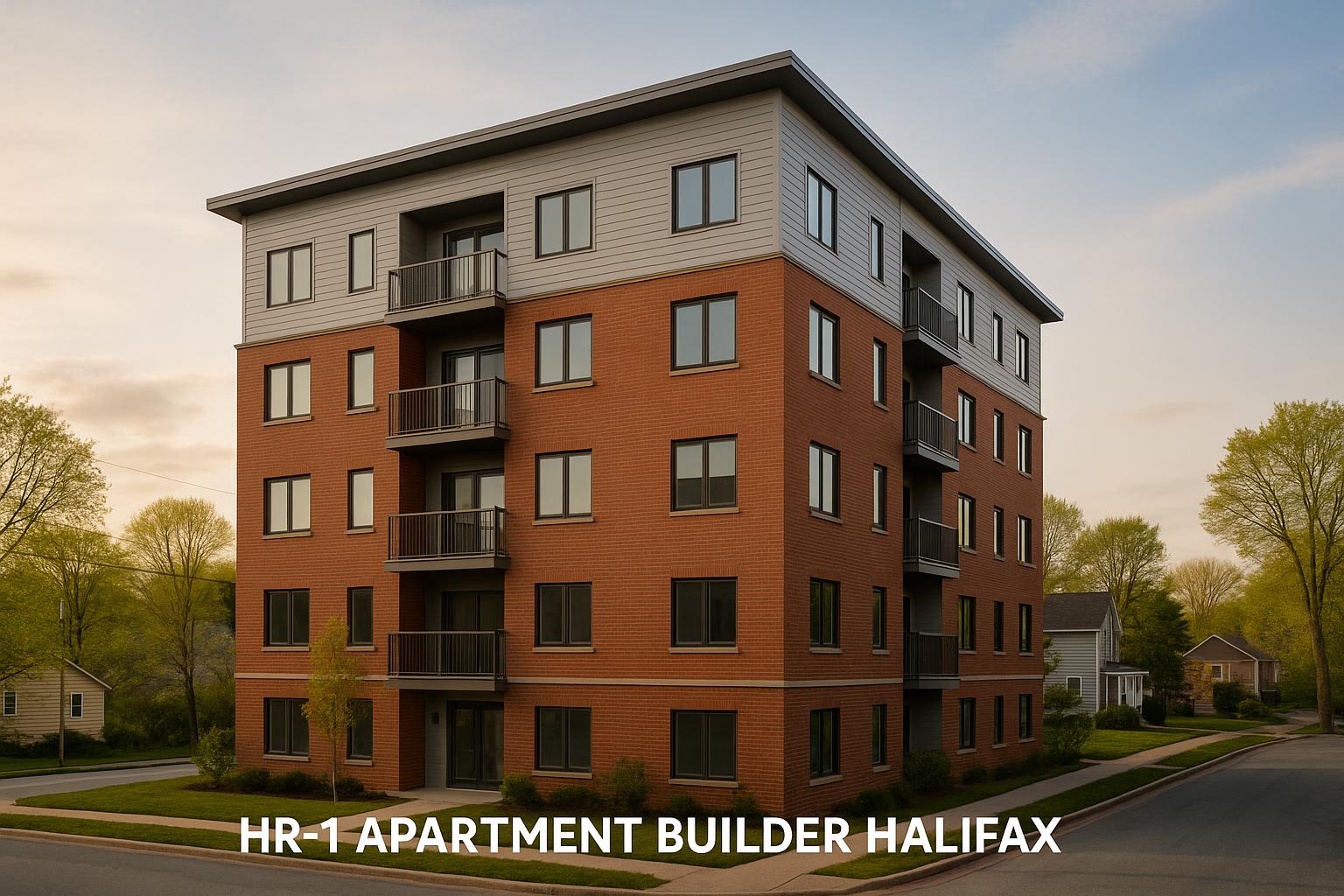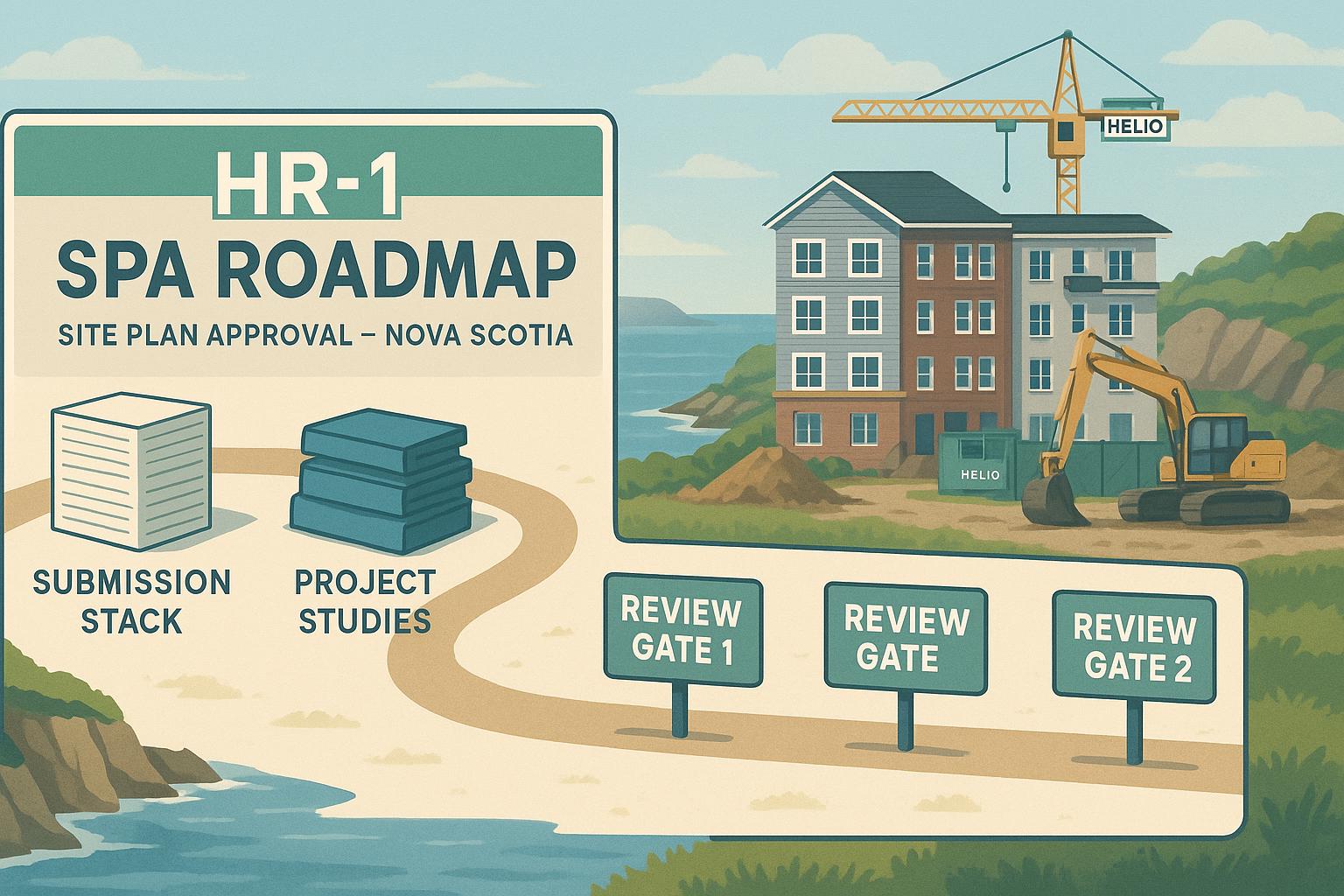In Nova Scotia, permit and inspection fees for building multi-unit rental properties vary widely by municipality. These fees, which are mandatory and non-negotiable, can significantly impact your project’s budget. Understanding how these costs are calculated - whether as flat rates, percentages of construction value, or based on the number of units - can help you plan more effectively. Key permits include building, plumbing, and electrical, with fees and inspection schedules differing across regions. For instance, Halifax charges higher fees but offers detailed inspection processes, while rural areas like Colchester have simpler, more predictable costs.
Quick Takeaways:
- Fees differ by municipality and can be flat or percentage-based.
- Building permits typically cost the most, followed by plumbing and electrical permits.
- Payment schedules and processing times vary, influencing cash flow and timelines.
- Halifax has higher fees but more complex requirements; rural areas tend to charge less.
- A downloadable dataset provides detailed municipal fee comparisons to help with budgeting.
Accurate budgeting for these fees is essential to avoid unexpected costs or delays. Use the dataset to compare municipalities, calculate costs, and plan your project effectively.
(The Lack of) Building Permits in Halifax, Nova Scotia: Canada's Open Secret.
How Permit and Inspection Fees Work in Nova Scotia
In Nova Scotia, permits and inspections operate under a municipal system, meaning fees can differ significantly depending on where your project is located. Each municipality uses its own method to calculate permit fees. These methods might include a flat rate based on the type of project, a percentage of the construction value, or a fee structure tied to the number of dwelling units. Knowing how your municipality calculates these fees is key to planning your budget accurately.
The timing of payments also varies. Some municipalities require full payment upfront before issuing permits, while others allow payments to be made in stages as the construction progresses. This difference can have a direct impact on your cash flow during the project.
In addition to payment schedules, the permits and inspections themselves are essential for project approval and must be factored into both planning and budgeting.
Required Permits and Inspections
For multi-unit construction projects, several permits and inspections are necessary. The building permit is the primary authorization and typically comes with the highest cost. Its fee might be calculated based on the project's total area, a flat rate, or a percentage of the construction cost.
Other essential permits include plumbing and electrical permits, which are mandatory for all multi-unit builds. Plumbing permits cover work such as water supply lines, drainage systems, and fixture installations, while electrical permits address service panels, wiring, and electrical fixtures. Both involve inspections at critical points in the construction process.
In some cases, additional development permits may be required, especially if the project falls under specific zoning or design guidelines for multi-unit properties.
Inspections occur at key stages of the build - such as foundation, framing, mechanical systems, and final occupancy. The number and cost of these inspections are determined by both the complexity of your project and the policies of the municipality where the work is being carried out.
Municipal vs Provincial Requirements
While the Province of Nova Scotia sets minimum building standards through the Nova Scotia Building Code - which outlines safety, accessibility, and energy efficiency requirements - municipalities have the authority to establish their own fee structures, inspection schedules, and additional requirements. These can include enhanced fire safety measures, unique architectural standards, or environmental assessments.
For instance, Halifax Regional Municipality has additional fees tied to development charge calculations and stormwater management. Smaller municipalities, on the other hand, may have simpler fee systems but could face longer processing times due to limited resources.
Some municipalities also offer expedited review processes for multi-unit projects. While these faster approvals come at a higher cost, they can significantly reduce delays in obtaining permits.
Understanding these local differences is essential for aligning your project’s timeline and budget with municipal practices. The variations in fees and processes reflect broader differences in municipal services, development demands, and administrative capacities, all of which can shape your overall construction experience.
2025 Fee Comparison Table by Municipality
The table below provides a clear breakdown of how municipal fees for building projects differ across Nova Scotia. Since these fees can have a significant impact on your construction budget, understanding the variations is key to planning effectively. The table outlines building permit fees, plumbing permit fees, electrical permit fees, and the total estimated costs for a standard 4‑unit residential project, with municipalities listed alphabetically.
| Municipality | Building Permit Fee | Plumbing Permit | Electrical Permit | Total Fees (4‑unit project) |
|---|---|---|---|---|
| Cape Breton Regional Municipality | $6.75 per $1,000 construction value | $100 fixed fee | $125 fixed fee | $3,600 – $5,625 |
| Colchester County | $4.25 per $1,000 construction value | $80 fixed fee | $95 fixed fee | $2,300 – $3,550 |
| Halifax Regional Municipality | $8.50 per $1,000 construction value | $125 + $25 per fixture | $150 + $15 per outlet | $4,275 – $6,800 |
| Kings County | $5.25 per $1,000 construction value | $75 fixed fee | $100 fixed fee | $2,800 – $4,375 |
| Lunenburg County | $4.50 per $1,000 construction value | $85 fixed fee | $90 fixed fee | $2,425 – $3,750 |
| Pictou County | $5.00 per $1,000 construction value | $90 fixed fee | $110 fixed fee | $2,700 – $4,200 |
Fees are estimated based on construction values between $500,000 and $800,000 for a typical 4‑unit residential project.
How to Use the Fee Table
To calculate your costs, determine whether the fees are fixed or percentage-based. For percentage-based fees, multiply your project's construction value by the rate provided. For instance, a $600,000 project in Halifax would incur a building permit fee of $600,000 ÷ 1,000 × $8.50 = $5,100.
The "Total Fees" column gives an estimate for a standard 4‑unit residential project. However, keep in mind this estimate only covers the primary permits and doesn’t include extra costs like development charges or plan review fees.
Fee Differences Between Municipalities
Nova Scotia's municipalities show a wide range of fee structures, with some charging nearly three times as much as others for similar projects. Halifax Regional Municipality, for example, has higher fees, which align with its detailed inspection and permit processes. On the other hand, rural areas like Colchester and Lunenburg counties offer more competitive rates, often using fixed-fee systems that provide predictable costs but may involve longer processing times.
Smaller municipalities often rely on fixed-rate systems. For example, Cape Breton’s plumbing permit fee remains $100 regardless of whether a project costs $400,000 or $800,000. Meanwhile, electrical permit fees generally show less variation, ranging from about $90 to $150, with occasional extra charges for outlets or circuits. Plumbing permit fees, however, can differ more significantly, particularly in municipalities that base fees on the number of fixtures.
These differences highlight the unique cost-recovery approaches and administrative practices in each municipality, which can influence both your budget and project timeline.
sbb-itb-16b8a48
Download and Use the Fee Dataset
If you're diving into fee comparisons, this dataset is your go-to resource for a deeper and more detailed cost analysis. By downloading the spreadsheet, you’ll gain access to a wealth of information that goes beyond the basics in the summary table.
What's in the Dataset
Inside the spreadsheet, you'll find multiple worksheets packed with essential details about municipal fee requirements. These include:
- Fee schedules for various services
- Contact information for building departments
- Estimated processing times
- Special municipal policies that could affect your project timeline or overall costs
This information is tailored to help you navigate the specifics of municipal fees and plan your project more effectively.
How to Compare Costs for Your Project
Using the dataset’s filtering tools, you can easily sort information by municipality, project size, or location. This makes it simple to compare fee structures and adjust your budget and timeline to match your project's unique needs.
Budgeting Tips for Multi-Unit Construction Fees
Planning for permit and inspection fees requires a clear understanding of the factors that drive these costs and awareness of potential missteps that could delay your project. These tips complement the fee comparisons and dataset details shared earlier.
What Influences Your Permit Costs
- Project Size: Larger developments often come with higher permit fees because many municipalities calculate fees as a percentage of the total project value.
- Municipality Differences: Permit costs can vary widely depending on the municipality. Some charge flat fees regardless of project size, while others use percentage-based models, which can significantly increase costs for larger projects. The dataset provided earlier highlights these local variations, helping you account for location when budgeting.
- Application Timing: If you need to fast-track your application, expect to pay expedited processing fees. Planning ahead can help you avoid these extra charges.
- Building Code Requirements: Meeting or exceeding building codes can sometimes lead to additional review fees. However, this might save money in the long run by reducing the need for re-inspections.
Common Budgeting Errors to Watch For
- Overlooking Additional Permits: Focusing only on the building permit while ignoring fees for electrical, plumbing, or occupancy permits can lead to unexpected expenses.
- Skipping Re-inspection and Occupancy Costs: Failed inspections can result in extra charges, and forgetting to include occupancy permit fees in your budget could leave you scrambling to cover surprise costs.
- Missing Variance Applications: Zoning issues that arise late in the process may require variance applications, which come with their own fees and can delay your timeline.
Integrated vs Traditional Construction Methods
Your choice of construction approach can have a big impact on permit costs and project efficiency. Traditional methods, where property owners manage separate architects, engineers, and contractors, often lead to complications. Misaligned plans and specifications can require permit revisions, resulting in extra fees and delays.
On the other hand, integrated design-build companies manage the entire process, including permits, as part of their services. This approach minimizes coordination issues, reduces the need for revisions, and helps avoid unnecessary fees. Integrated design-build methods also cut down on re-inspections and keep projects on schedule and within budget. By opting for this streamlined approach, property owners can simplify the permitting process and sidestep many of the challenges that come with traditional construction methods.
Planning Your Nova Scotia Construction Project
Use the fee data and municipality comparisons to make informed decisions about where to build and how to budget effectively.
For instance, if you're working on a larger project, opting for a municipality with a flat-rate fee structure might save you money compared to percentage-based fees. Take the time to compare your target locations side by side. Look at factors like processing times and specific local requirements. Having this information upfront will help you create a clear and realistic budget while also shaping your financing strategies.
When planning your budget, make sure to account for all permit charges. It's common for property owners to overlook additional fees, which can quickly add up - especially for projects involving four or more units.
Think about how your construction method might affect the permitting process. If you’re using a traditional approach that involves separately managing architects, engineers, and contractors, misaligned plans can lead to revisions. These changes could result in extra fees and delays, potentially throwing off your budget. On the other hand, integrated construction methods, where all parties work together from the start, can help prevent these issues, saving both time and money.
Next Steps for Property Owners
With these insights into fees, you can start preparing your project plan by aligning your budget and financing with municipal requirements. Download the full dataset to compare fees, processing times, and any additional charges. This will equip you to craft a realistic budget and secure the necessary financing.
Also, consider how financing costs might be affected by your choice of municipality. Permit processing delays can increase your overall construction financing expenses. Some municipalities may charge higher upfront fees but offer quicker processing times, which could ultimately save you money on financing.
Understanding these costs early allows you to plan your financing and avoid unexpected cash flow issues during construction. Property owners who take the time to factor in these fees from the beginning often experience smoother project execution and better financial outcomes.
While permit and inspection fees are just one piece of the puzzle, addressing them accurately from the start creates a strong foundation for your multi-unit rental property project.
FAQs
How do permit and inspection fees in Nova Scotia affect the budget for building multi-unit rental properties?
When it comes to budgeting for multi-unit rental projects in Nova Scotia, permit and inspection fees are a significant consideration. These fees differ from one municipality to another and are usually calculated based on factors like the total construction value and floor area. Many municipalities apply a base fee along with an extra charge per $1,000 of construction value.
Beyond building permits, electrical inspections are also mandatory for installations, adding to the overall expenses. Being aware of these fees is crucial for accurate budgeting and effective planning, especially since costs can vary depending on the municipality. Having access to a detailed and up-to-date fee table for 2025 will allow property owners to compare costs more easily and plan their projects with greater precision.
What should I consider when choosing between flat-rate and percentage-based permit and inspection fees for multi-unit construction projects?
This article dives into the details of permit and inspection fees for multi-unit construction projects in Nova Scotia. It includes a 2025 municipality-specific table and a downloadable dataset to help you navigate the fee structures. While the article doesn’t directly compare flat-rate fees to percentage-based ones, the dataset makes it easier to pinpoint which municipalities follow each model and gives you a way to estimate costs for your project. For more precise guidance, consider reaching out to a local expert who understands Nova Scotia's municipal regulations.
How can property owners use the dataset to budget for permit and inspection fees in Nova Scotia?
Property owners in Nova Scotia can use this dataset to plan more effectively by comparing detailed, municipality-specific permit and inspection fees. It provides clarity on cost variations, making it easier to budget accurately for 4+ unit rental properties.
By tapping into this resource, you can anticipate expenses, sidestep surprises, and gain a clearer understanding of the financial demands tied to construction projects in your selected municipality.



